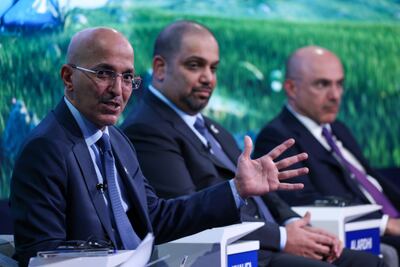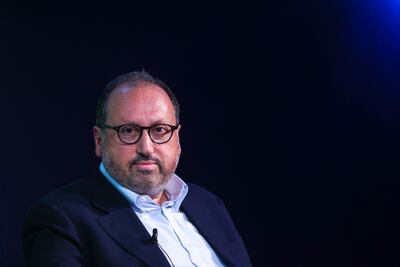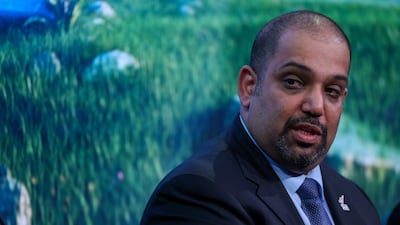During a session on the “Middle East and North Africa Economic Outlook” at Davos, Saudi Arabia's finance minister said the outlook for the Middle East and North Africa is “generally positive” but common challenges remain.
Mohammed Al Jadaan said energy security as a result of Covid-19 and the recovery from the pandemic, which has also strained supply chains, are among the risks.
“Food security is also another serious problem, again, fuelled by the geopolitical situation,” Mr Al Jadaan said.
However, the Saudi economy is projected to grow at 7.4 per cent this year, he said, driven by higher oil prices. Brent Crude is currently above $110 per barrel.
Bahrain’s Minister of Finance and National Economy Sheikh Salman bin Khalifa said “high oil prices have the benefit of reducing funding needs”.
“Strong economic growth towards the end of 2021 has continued, picking up pace through 2022,” he said.
Bahrain is on course to more than triple non-oil revenue by the end of this year compared to 2018, he said.
“Let us not underestimate the work that has been done on increasing non-oil revenue. And today, the increase in oil prices has masked the amount of effort and the amount of results that have been delivered by that increase,” he said.
Mohammed Alardhi, executive chairman of alternative asset manager Investcorp, said with oil prices where they are, GCC economies are “living the ideal scenario”, especially where inflation is concerned, in which producers can “raise prices, expand volume and not raise costs”.
“We’re very optimistic. We're deploying capital in the Gulf and it's a great story,” Mr Alardhi said.

Mall operator Majid Al Futtaim’s chief executive Alain Bejjani said the “biggest lost opportunity is that Mena region is not a region”.
“And unless we get to a point where this Mena region becomes a region that we can easily punch [our weight] where we should be punching, we're going to continue to be on the path,” he said.
“We're launching tomorrow … a report on regional economic integration, and one of the things that you will find is the fact that the Mena region on average produces half the GDP [compared to] the average global GDP [per capita],” Mr Bejjani added.
“So, each one of us individually in the Mena region, we actually produce half what an average person in the world produces, or contributes, which tells you a great story about what we are missing.
“We owe it to our region, we owe it to the almost 600 million people that live from North Africa all the way to Pakistan, to really work together in order to push this region to reach its economic potential.”
But the UAE and Saudi Arabia are major engines of growth “at their best”, thanks to reforms made in these economies, Mr Bejjani said.
Although the Mena region imports most of its food, inflation will be less of an issue compared to elsewhere in the world thanks to central banks and regulators having more tools to deal with it, he said.
“I would say [there is a] value conscious customer, because of the inflationary pressures, definitely. And it is something that is going to become more and more of an issue in the coming months and years, depending how the geopolitical situation evolves.”

Mr Al Jadaan said, however, that “it is very critical for international organisations and multilateral development institutions, including the World Bank, to look at this region very carefully and very quickly”.
“There are countries that really, really need support and we are working with the [International Monetary Fund], the World Bank, but using this forum, I would like really everyone to take this very seriously,” he said.
Sheikh Salman said “sustainable growth is what we should be delivering”.
“Inflationary pressures have to be managed, but you should not compromise the drive to deliver sustainable growth. Efforts to try and do that, to try and slow down the growth on purpose, the results are in the history books,” he said.


